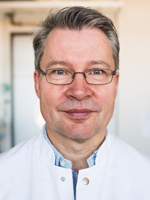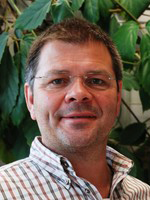
Norman Dovichi is the Grace-Rupley Professor of Chemistry and Biochemistry at the University of Notre Dame. In the 1980s, he introduced the concept of single molecule detection to the chemical literature. In the 1990s, his group developed capillary array electrophoresis instruments for high-throughput DNA sequencing. He was recognized for this work by the journal Science as an “Unsung Hero of the Human Genome Project”. Over the last decade, his group has focused its attention on coupling capillary electrophoresis with tandem mass spectrometry as a tool for high throughput and high sensitivity proteomics. Recent results include detection of 10,000 peptides in an 80-min single-shot separation of the HeLa proteome, detection of 2,300 phosphopeptides in a 100-min single shot separation, and detection of low zeptomole amounts of tryptic peptides in complex mixtures. Finally, his group used HPLC-MS/MS for the first proteomic analysis of vertebrate development. Over 5,500 proteins were quantified at six stages of early development of Xenopus laevis. This work has been extended to the characterization of protein expression in single blastomeres isolated from embryos at the 2, 4, 8, 16, 32, and 50-cell stage. These are the first comprehensive studies of protein expression in single vertebrate cells.

Prof. Klaus Pantel graduated in 1986 from Cologne University in Germany and completed his thesis on mathematical modelling of hematopoiesis in 1987. After his postdoctoral period in the USA on hematopoietic stem cell regulation (Wayne State University, Detroit), he performed research on cancer micrometastasis at the Institute of Immunology, University of Munich for 10 years. Currently, Prof Pantel is Chairman of the Institute of Tumour Biology at the University Medical Center Hamburg-Eppendorf. The institute is part of the University Cancer Center Hamburg (UCCH). The pioneer work of Prof Pantel in the field of cancer micrometastasis, circulating tumor cells and circulating nucleic acids (ctDNA, microRNAs) is reflected by more than 300 publications in excellent high ranking biomedical and scientific journals (incl. NEJM, Lancet, Nature Journals, Cancer Cell, PNAS, JCO, JNCI, Cancer Res.) and has been awarded recently (AACR Outstanding Investigator Award 2010, German Cancer Award 2010, ERC Advanced Investigator Grant 2011). Moreover, Prof Pantel was co-ordinator of the FP6 EU STREP “DISMAL” (Disseminated Malignancies, www.dismal-project.eu), coordinates now the European TRANSCAN group “CTC-SCAN” and the EU IMI Network Project “CANCER-ID” (www.cancer-id.eu) and serves on the Editorial Boards of international cancer journals (e.g., Clin. Cancer Res., Breast Cancer Res., Cancer Res.).

Organization: Université Côte d'Azur, Institut de Pharmacologie Moléculaire et Cellulaire
Web page: http://www.ipmc.cnrs.fr

Web page: http://www.ipmc.cnrs.fr

Pascal Barbry's early work focused on identifying the structure of ion channels involved in epithelial ion transport in tissues. This initial work develop approaches and tools to study several ion channels (epithelial Na+ channel, CFTR, etc). It enabled the characterization of mutant forms of CFTR which are responsible for cystic fibrosis, and to the identification of the first pharmacological molecule able to activate them. This discovery was one of the earliest evidence that a pharmacological approach could be beneficial to the patients.
His current work focuses on RNA, including non-coding RNAs, which do not encode any protein, but may have significant biological effects. Pascal Barbry studies them in the context of pathologies such as cystic fibrosis, asthma, pulmonary fibrosis, lung cancers. Some microRNAs, for instance, are important during differentiation of airway epithelial cells. Using large-scale approaches, the researcher and his team at IPMC (Sophia Antipolis, France) is now trying to reconstruct the successive events that contribute to the differentiation of an airway epithelial cell, and how a group of neighbouring cells develop a sort of collaborative ecosystem, where distinct cells can fulfill complementary tasks. RNA sequencing, including at the single cell level, genomics and bioinformatics techniques are instrumental to perform this research that Pascal Barbry and his team combine with molecular and cellular approaches.
His current work focuses on RNA, including non-coding RNAs, which do not encode any protein, but may have significant biological effects. Pascal Barbry studies them in the context of pathologies such as cystic fibrosis, asthma, pulmonary fibrosis, lung cancers. Some microRNAs, for instance, are important during differentiation of airway epithelial cells. Using large-scale approaches, the researcher and his team at IPMC (Sophia Antipolis, France) is now trying to reconstruct the successive events that contribute to the differentiation of an airway epithelial cell, and how a group of neighbouring cells develop a sort of collaborative ecosystem, where distinct cells can fulfill complementary tasks. RNA sequencing, including at the single cell level, genomics and bioinformatics techniques are instrumental to perform this research that Pascal Barbry and his team combine with molecular and cellular approaches.

Organization: Biodynamic Optical Imaging Center, Integrated Science Research Center, Peking University, China
Web page: http://biopic.pku.edu.cn/

Web page: http://biopic.pku.edu.cn/

Dr. Fuchou Tang is Professor at BIOPIC, College of Life Sciences, Peking University. He is also Associate Director of Beijing Advanced Innovation Center for Genomics. He set up his own lab as a principal investigator at Peking University in 2010. Dr. Fuchou Tang’s lab focuses on the epigenetic regulation of gene expression network during human early embryonic development and germline development (Cell, 2013; Nature, 2014; Cell Stem Cell, 2014; Cell, 2015; Science, 2015; Nature, 2016; Cell Stem Cell, 2017a, 2017b, 2017c). His lab pioneered the single cell sequencing field and has systematically developed a serial of single cell functional genomic sequencing technologies [scRRBS (Genome Research, 2013); scMicrofluidic-seq (PNAS, 2014); SUPER-seq (Genome Biology, 2015); scTrio-seq (Cell Research, 2016); scCLEVER-seq (Cell Stem Cell, 2017b); scCOOL-seq (Cell Research, 2017); MR-seq (Science Bulletin, 2017)]. His work has been cited for more than 5,000 times. Some of his work has been selected as Top 10 scientific and technological progresses of China in the year of 2014 and Top 10 scientific and technological progresses of China in the year of 2015. He is editorial board members of Science Bulletin, Genome Biology, & Open Biology. He organized the Cold Spring Harbor Asia conference of Frontiers in Single Cell Genomics in 2016.

Marc H. Wadsworth II received his B.S in Chemistry Cum Laude from Miami University of Ohio in 2014 and is currently pursuing a PhD in Chemistry at MIT with Prof. Alex K. Shalek’s lab. His research interests center on the development and application of new technologies to elucidate how cells and their interactions lead to system-level functions in health and disease. Illustratively, Marc was a co-developer of Seq-Well, a massively-parallel single-cell RNA-Seq platform for low-input clinical samples. He has since applied Seq-Well and related methods to examine, at unprecedented resolution, the ecosystems of M. Tuberculosis and Malaria infections.

Professor Leon WMM Terstappen, MD, PhD is chair of the department of Medical Cell BioPhysics at the University of Twente, The Netherlands. He received his medical degree from the University of Groningen in 1983 and his PhD in 1988 from the University of Twente. In 1987 he started as post-doctoral fellow at the research department of Becton Dickinson Immunocytometry systems in Mountain View CA, USA and held various research positions thereafter. In 1994 he started as Chief Scientific Officer at Immunicon Corporation, Huntingdon Valley, PA, USA and in 2007 he was appointed at the University of Twente. He is an international recognized expert in cytometry and pioneered the detection of rare cells. He was in charge of the development of the CellSearch system, the only FDA cleared platform to enumerate circulating cancer cells in blood, which was awarded the “Prix Galien”, the major prize for in-vitro diagnostics devices. He currently is the program leader of the STW Perspectief program Cancer-ID and co-leader of the EU IMI program CANCER-ID both programs aim to develop and validate “liquid biopsies” technologies for personalized cancer care. Terstappen is a recipient of the Max Fulwyler Award for Innovative Excellence.

Anders Ståhlberg, Associate Professor, is working as principal investigator at the Cancer Center, Sahlgrenska Academy, University of Gothenburg in Sweden. He has a PhD in molecular biotechnology and has two post-doc periods working with human embryonic stem cells and tumor biology. Anders primary research interest is to understand molecular mechanisms in tumor initiation, tumor development and stem cell differentiation. The research is focused on breast cancer and sarcomas. He has developed several strategies for gene expression profiling and rare molecule analysis, especially at the single-cell level.

Organization: Department of Genetics, Institute for Cancer Research, Oslo University Hospital, Radiumhospitalet, Oslo, Norway
Web page: https://www.ous-research.no/

Web page: https://www.ous-research.no/

Vessela Kristensen graduated the Faculty of Natural Sciences, Charles University, Prague in 1990 and got her PhD from the Faculty of Medicine at the same university in 1996. The same year she moved to Norway. In the course of her 20 year career in Norway Kristensen has published 218 peer reviewed research papers with 6137 citations, brought up 16 PhD students to successful thesis defence as a main supervisor, and authored and co-authored around 20 scientific grants. Her career as a group leader started in 2003 with a career development research grant from the Research Council of Norway “Integral approach to characterize clinically and therapeutically relevant biological pathways in human cancer”. This field is a main topic of her research also today. Her h index is 44 and her Research Gate score is 47.71.

Martin Hemberg is a group leader at the Wellcome Trust Sanger Institute where his primary research interests are in quantitative models of gene regulation and gene expression. Currently, the main focus of the group is to develop methods and models for computational analysis of high throughput sequencing data obtained from single-cell experiments that will allow researchers to address novel biological questions.

Organization: Centre Hospitalier Universitaire de Montpellier , France
Web page: https://www.cancer-id.eu/

Web page: https://www.cancer-id.eu/

Dr Catherine Alix-Panabières received her PhD degree in 1998 at the Institute of Virology, University Louis Pasteur, in Strasbourg in France. In 1999, she moved to Montpellier where she did a postdoctoral research in the Department of Immuno-Virology of the University Medical Centre of Montpellier, France. During this last decade, Dr Alix-Panabières has focused on optimizing new techniques of enrichment and detection of viable disseminating tumor cells in patients with solid tumors. She is the expert for the EPISPOT technology that is used to detect viable tumor cells in the peripheral blood and the bone marrow of patients with breast, prostate, colon, head & neck cancer and melanoma. This technology has been recently improved to detect functional CTCs at the single cell level and is called EPIDROP.
In 2010, she achieved getting a permanent position at the Hospital and at the Faculty of Medicine of Montpellier (MCU-PH), a wonderful mixture of giving teaching lessons to medical students on Cancer Biology in combination of developing this field of tumor cell dissemination at the hospital for the cancer patients, leading strongly translational clinical research. As an associate professor, she recently became the new director of the Laboratory of Rare Human Circulating Cells (LCCRH) in the Department of Pathology and Onco-Biology.
In this unique platform LCCRH, they isolate, detect and characterize circulating tumor cells using combinations of the EPISPOT assay, the CellSearch® system (Silicon Biosystem - Menarini), the flow cytometry, the CellCollector (GILUPI), the molecular biology (AmpliSpeed device), the Parsortix system (Angle) and the DEPArray (Silicon
Biosystem - Menarini) for single cell sorting. She has authored or co-authored >60 scientific publications in this field during the last years including 10 book chapters, she is the inventor of three patents in the liquid biopsy field and she is part of French national projects: for ex, PANTHER (FUI project) as well as of big European projects: CTC-SCAN (Transcan project), CANCER-ID (IMI project) and European Liquid Biopsy Academy (ELBA, Marie-Curie project).
After she got the Scientific Prize given by the Region Languedoc-Roussillon in 2008, it was a great honor for her to receive the Gallet et Breton Cancer Prize, the highest honor conferred by the French Academy of Medicine in November 2012 and, very recently, the 2017 AACR Award for the most cited scientific article in 2015 (Cayrefourcq et al. Cancer Res).
In 2010, she achieved getting a permanent position at the Hospital and at the Faculty of Medicine of Montpellier (MCU-PH), a wonderful mixture of giving teaching lessons to medical students on Cancer Biology in combination of developing this field of tumor cell dissemination at the hospital for the cancer patients, leading strongly translational clinical research. As an associate professor, she recently became the new director of the Laboratory of Rare Human Circulating Cells (LCCRH) in the Department of Pathology and Onco-Biology.
In this unique platform LCCRH, they isolate, detect and characterize circulating tumor cells using combinations of the EPISPOT assay, the CellSearch® system (Silicon Biosystem - Menarini), the flow cytometry, the CellCollector (GILUPI), the molecular biology (AmpliSpeed device), the Parsortix system (Angle) and the DEPArray (Silicon
Biosystem - Menarini) for single cell sorting. She has authored or co-authored >60 scientific publications in this field during the last years including 10 book chapters, she is the inventor of three patents in the liquid biopsy field and she is part of French national projects: for ex, PANTHER (FUI project) as well as of big European projects: CTC-SCAN (Transcan project), CANCER-ID (IMI project) and European Liquid Biopsy Academy (ELBA, Marie-Curie project).
After she got the Scientific Prize given by the Region Languedoc-Roussillon in 2008, it was a great honor for her to receive the Gallet et Breton Cancer Prize, the highest honor conferred by the French Academy of Medicine in November 2012 and, very recently, the 2017 AACR Award for the most cited scientific article in 2015 (Cayrefourcq et al. Cancer Res).

Organization: Technische Universität München, Freising-Weihenstephan, Germany
Web page: https://www.tum.de/
Personal page

Web page: https://www.tum.de/
Personal page

Michael W. Pfaffl started 1986 to study ‘Agriculture - Animal Science’ and ‘Biotechnology’ at the Technical University of Munich (TUM). In 1997 he obtained his PhD in ‘Molecular Physiology’ in the field of molecular muscle and growth physiology at the Chair of Physiology. In June 2003 he completed his Venia Legendi (Dr. habil.) at the Center of Life and Food Sciences Weihenstephan with the title ‘Livestock transcriptomics -- Quantitative mRNA analytics in molecular endocrinology and mammary gland physiology’.
Early 2010 he became Professor of ‘Molecular Physiology’ at the TUM School of Life Sciences. Today he has reached the ‘Principal Investigator’ status at the Institute of Animal Physiology & Immunology and is one of the leading scientists in the field of Gene Quantification, RT-qPCR technology, RNA sequencing, and complex data analysis in mRNA & small-RNA expression profiling.
He is author of around 180 peer reviewed publications, 45 book chapters, and held more than 230 lectures worldwide. In March 2012 the Elsevier SciVerse Scopus Award 2012 was granted to Prof. Michael W. Pfaffl, whose top cited Scopus article entitled "A new mathematical model for relative quantification in real-time RT-PCR" published 2001 in Nucleic Acids Research 29(9) has been cited today more than 21,800 times.
He is coauthor of the Minimum Information for Publication of Quantitative Real-Time PCR Experiments (MIQE) guidelines (2009) and coauthor of the dMIQE guidelines for digital PCR (2013).
Professor Michael W. Pfaffl has editorial involvements as Founding- & Section-Editor in ‘Biomolecular Detection and Quantification’, Editor in ‘Methods’ and ‘International Journal of Oncology’, and Editor-in-Chief of the ‘Gene Quantification’ webportal (www.gene-quantification.info), the world biggest webpage around qPCR, dPCR and Gene Expression profiling techniques and applications. He is initiator and lead organizer of the qPCR, dPCR & NGS Gene Quantification Event series in Freising Weihenstephan in Germany since 2004 (www.eConferences.de).
Early 2010 he became Professor of ‘Molecular Physiology’ at the TUM School of Life Sciences. Today he has reached the ‘Principal Investigator’ status at the Institute of Animal Physiology & Immunology and is one of the leading scientists in the field of Gene Quantification, RT-qPCR technology, RNA sequencing, and complex data analysis in mRNA & small-RNA expression profiling.
He is author of around 180 peer reviewed publications, 45 book chapters, and held more than 230 lectures worldwide. In March 2012 the Elsevier SciVerse Scopus Award 2012 was granted to Prof. Michael W. Pfaffl, whose top cited Scopus article entitled "A new mathematical model for relative quantification in real-time RT-PCR" published 2001 in Nucleic Acids Research 29(9) has been cited today more than 21,800 times.
He is coauthor of the Minimum Information for Publication of Quantitative Real-Time PCR Experiments (MIQE) guidelines (2009) and coauthor of the dMIQE guidelines for digital PCR (2013).
Professor Michael W. Pfaffl has editorial involvements as Founding- & Section-Editor in ‘Biomolecular Detection and Quantification’, Editor in ‘Methods’ and ‘International Journal of Oncology’, and Editor-in-Chief of the ‘Gene Quantification’ webportal (www.gene-quantification.info), the world biggest webpage around qPCR, dPCR and Gene Expression profiling techniques and applications. He is initiator and lead organizer of the qPCR, dPCR & NGS Gene Quantification Event series in Freising Weihenstephan in Germany since 2004 (www.eConferences.de).

Organization: Department of Chemistry, University of Athens, Greece
Web page: http://en.actc-lab.chem.uoa.gr/

Web page: http://en.actc-lab.chem.uoa.gr/

Dr. Evi Lianidou is Professor of Analytical Chemistry and Clinical Chemistry at the Department of Chemistry, University of Athens, Greece. Dr Lianidou has established a Molecular Diagnostics Laboratory focused on Liquid Biopsy at the Department of Chemistry since 1998 (http://en.actc-lab.chem.uoa.gr/). Her lab is specializing in the Analysis of Circulating Tumor Cells (ACTC), and has access to many patient samples through extensive clinical collaborations. Her main research interests are on the development and clinical evaluation of: a) single-plex and multiplex quantitative RT-qPCR assays for the detection and molecular characterization of CTCs, b) multiplex assays for gene expression in CTCs based on the liquid bead array, c) DNA methylation assays in CTCs and ctDNA, d) highly sensitive assays for mutation analysis in CTCs and in ctDNA, and evaluation of circulating miRNAs as tumor biomarkers in plasma. Dr. Lianidou has 108 publications (https://www.ncbi.nlm.nih.gov/pubmed/?term=lianidou) and has organized together with Prof K. Pantel: a) the 7th International Symposium on Minimal Residual Disease in Athens, (http://ismrc2009.chem.uoa.gr) , b) a scientific meeting on CTCs “Advances in Circulating Tumor Cells: From Basic Research to Clinical Practice” (www.actc2012.org), and c) the 2nd ACTC meeting, (October 8th-11th, 2014), in Crete, Greece (www.actc2014.org). Dr. Lianidou is now organizing the 3rd ACTC meeting, (October 4th-7th, 2017), in Rhodes, Greece (www.actc2017.org). Prof Lianidou is PI in the European TRANSCAN group “CTC-SCAN” and in the EU IMI Network Project “CANCER-ID” (www.cancer-id.eu) and serves on the Editorial Boards of many international journals including Clin Chemistry, Clin. Cancer Res, Breast Cancer Res, Cancer Res, Oncotarget, and many others. Dr. Lianidou is an elected member and Chair of the Committee for Clinical Molecular Biology Curriculum of the International Federation of Clinical Chemistry (IFCC), (http://www.ifcc.org/ifcc-education-division/emd-committees/c-cmbc/) and is coordinating the M.Sc. program of Clinical Chemistry, at the Department of Chemistry, University of Athens (http://en.clinical-chemistry.chem.uoa.gr/).

Organization: University Hospital of the Heinrich-Heine-University
Web page: http://www.uniklinik-duesseldorf.de/

Web page: http://www.uniklinik-duesseldorf.de/

Nikolas Stoecklein is currently a Professor for Experimental Surgical Oncology at the Heinrich-Heine University Düsseldorf (HHU), Germany. His major research interests are minimal residual disease and early systemic disease in cancer. A current focus of his group is to improve CTC-based liquid biopsies. He pioneered Diagnostic Leukapheresis (DLA) for enhanced CTC detection and established workflows to analyze the rare CTCs comprehensively at single cell level. Prior joining the HHU, Nikolas obtained post-doctoral training at the Institute of Immunology of the Ludwig-Maximilians-University Munich, Germany, in the group of Christoph Klein. He graduated from the University of Hamburg, Germany, in 1998 where he studied medicine.

Organization: Institute of Biotechnology CAS, v. v. i., Czech Republic
Web page: http://www.ibt.cas.cz/

Web page: http://www.ibt.cas.cz/

Lukas Valihrach is a postdoctoral fellow at Institute of Biotechnology CAS in BIOCEV, Vestec, Czech Republic. He has a broad experience with gene expression profiling using RT-qPCR and other techniques in different biological systems. Last 5 years his research is primarily focused on the single cell analysis in the field of glial cell biology (ischemic brain injury, neurodegenerative diseases). He is also active in the development of new methods (Two-tailed PCR for miRNA profiling) and quality control tools for single cell expression profiling.

Organization: Institute of Biotechnology CAS, v. v. i., Czech Republic
Web page: http://www.ibt.cas.cz/

Web page: http://www.ibt.cas.cz/

Radek Sindelka is working as an independent scientist at the Institute of Biotechnology of the Czech Academy of Sciences. He uses African-clawed frog embryos as a model for asymmetric localization during early development and for identification of molecular regulation of wound healing and regeneration.

Dr Kubista is founder and CEO of the TATAA Biocenter and the head of the department of gene expression at the Institute of Biotechnology of the Czech Academy of Sciences. He was one of the pioneers contributing to the development of quantitative real-time PCR (qPCR) and introduced qPCR for single cell expression profiling. He led the development of reagents for high throughput expression profiling and quality control at TATAA and he developed qPCR tomography for intracellular expression profiling.